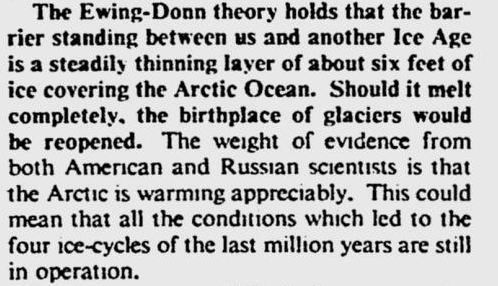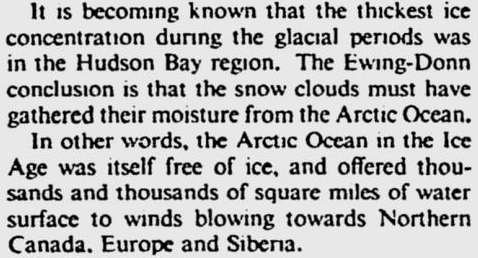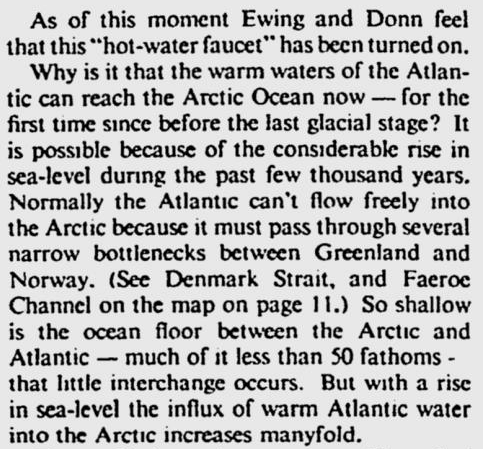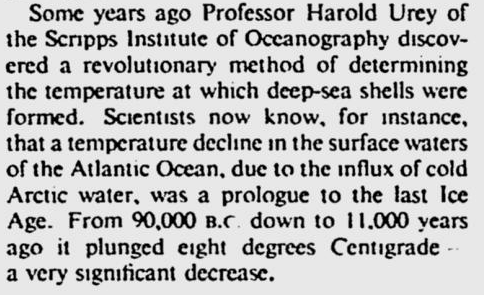Some amazing gems in this article. A fascinating explanation of what causes ice ages.
Ice was the same thickness in 1958 as today, and “steadily thinning.”
Arctic Ocean is ice free during ice ages. This is plausible. We know that the Bering Strait was ice free when people crossed from Asia to North America.
This is what I have been saying. In situ melt is not the cause Arctic ice loss over the last 20 years. The whole summer extent game is a mindless distraction.
Rising sea levels trigger ice ages
Scripps used to do actual climate science!
http://news.google.com/newspapers
h/t to glacierman








One of my biggest pet peeves is the no nothings that think the Arctic Ice pack is what is left over from the last ice age and when it melts, its gone forever. The continental glaciers that covered North America did not originate in the Arctic Ocean! Come on bedwetters, use a little logic. Do you think two-mile thick glaciers could originate over water?
More
http://tinyurl.com/3wk4huf
There’s a lot of information when searching the authors. This is quite interesting. One notes the North Atlantic seems to be transitioning to a cooler phase, possibly a signal the AMO is peaked and may be going negative. If the NA feeds the Arctic ice melt, wouldn’t that imply we should be seeing an increase in Arctic ice extent/volume in the coming years?
OHC appears to have taken a sharp downward move in recent years in the Arctic and NA. How does that fit in with the article should it continue? I’m not sure what to think anymore with so many competing hypotheses on Arctic ice.
Interesting idea, but I’m not convinced. Consider the formation of thick glaciers at the onset of an ice age. Would this not cause a drop in sea level, thus a freezing over of the Arctis again, stopping the beginning ice age in its tracks?
Whenever a hypothesis contradicts reality, the hypothesis if proven wrong. That is the scientific principle.
In this case, DirkH hypothesizes that the formation of thick glaciers at the onset of an ice age will cause a drop in sea level, and that will result in “a freezing over of the Arctis [sic] again, stopping the beginning ice age in its tracks.”
Please note that we know that there have been four major ice ages in the past million years of the earth’s history. Therefore, we can unequivocally say that the hypothesis is false.
If you modify the hypothesis to claim that “most of the time the formation of thick glaciers… …results in stopping the beginning ice age”, disproving that hypothesis would require identifying historic evidence of major glaciation NOT followed by a major ice age.
Aha ! —hmmmmmmm…. This is complicated.
There must be a new circulation route (air & sea) that reinforces long term snowfall (glacial buildup) and enough cloud coverage to keep the blanket insulated. The overridding event(s) is indeed elusive, but I have no doubt will show itself again.
… We know that the Bering Strait was ice free when people crossed from Asia to North America.
Not to be real finicky or anything, but the Bering Straits region was dry land when people first crossed to North America from Asia. Beringia was a major land mass before post-Pleistocene sea level changes drowned it.
Oh, I thought they walked on water.
So in the ice age the Arctic ocean was ice free and this blew warm air down to Canada where it hit colder air and then the moisture fell as snow.
Perhaps in a parallel universe…
Was LSD around in 1958?
Andy
What is so complicated about that? The air in the Canadian Arctic is normally colder than at the pole during the winter.
This idea is all new to me, but very interesting none-the-less. But as a complete novice in such matters, may I ask – if and when the ice-caps melt, how will this increase the sea-levels?
I have always understood that water expands when it freezes, but when ice is floating in water, 90% or so is below the surface, so in my ignorance, I would have thought that the 10% above the surface would be compensated for when the 90% below the suface melts, and decreases it’s volume.
Does that make sense to anyone – or am I just hopelessly wrong here?
The density of ice is less than water. That is why it floats.
Very interessting theory. Though it still leaves the issue of where the snow came from for nw europe. It does raise an issue though. How much snow would need to fall in say uk to survive summer (essential to jump start the process)? Any ideas or estimates? 50ft, 100ft? 200ft? More in the usa. Existing ice age theories dont adress this.